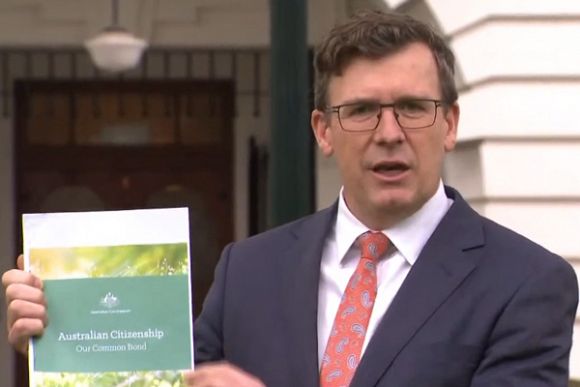New requirements for the English language test will make it more difficult for visa applicants in abusive relationships to leave, writes Gregory Rohan.
IN THE OCTOBER Federal Budget, the Government announced changes to the Adult Migrant English Program (AMEP) including expanding the eligibility criteria for the program and removing the cap on the number of hours of English tuition available.
While the changes were generally welcomed, they came with a sting: from late 2021, "Partner" visa applicants and sponsors will need to meet English language requirements before a permanent visa can be granted.
On top of adding new hurdles to an already slow and expensive process, the proposed English requirements sparked concerns from current and prospective visa applicants that they would be denied the opportunity to settle in Australia with their partner if they fail the test.
While the Government has justified the changes as necessary to improve employment outcomes for new migrants and to protect non-English speakers who they claim are more vulnerable to domestic and family violence (DFV) and exploitation, the new English language requirement for Partner visas is in fact unnecessary, discriminatory, unfair and will inevitably make it even harder for temporary visa holders – especially women – to leave violent relationships.
English requirement detrimental to temporary visa holders in abusive relationships
The framing of the English language requirement as a response to the serious and complex issue of DFV amongst temporary visa holders was surprising, especially since there has been no consultation with any DFV survivors or any community organisations prior to these changes being announced.
At the Immigration Advice and Rights Centre (IARC), we specialise in DFV-related immigration matters. Last year, we provided legal assistance to over 400 people – overwhelmingly women – in violent relationships. We are very close to this issue and the reality of the lived experiences of DFV survivors.
The assumption that people are inherently at greater risk of DFV because of their low English proficiency is simplistic and dismisses the drivers of DFV and the broad systemic barriers that stop people on temporary visas from seeking help. Temporary visa holders are ineligible for Centrelink and social housing and may not be able to access Medicare. They are often financially dependent on their partner and some of them may face stigma and social isolation if they were to leave the relationship.
Time and time again, our clients have told us that the perpetrators of violence against them have used their visa status as a form of control and that fears of visa cancellation, removal from Australia and separation from their children stop them from seeking help. Permanent residency is often seen as providing the security and access to services and support that temporary visa holders experiencing DFV need to leave violent relationships. The proposed English language requirement will simply make it even harder.
Data don’t stack up
The Department of Home Affairs’ own data don’t support the claim that English proficiency will improve employment outcomes. As the Department concedes in its consultation paper, the majority of Partner visa holders and sponsors speak English, with 84 per cent speaking English well or as their best or only language.
The Department's Continuous Survey of Australia's Migrants also shows that Partner visa holders and their sponsors generally have comparable or higher levels of employment, labour force participation and full-time employment to the general population.
One metric where Partner visa migrants clearly lag behind the rest of the community is in unemployment, which is significantly higher than the general population. But as the survey shows, a significant driver of this is the substantial amount of unpaid care that Partner visa holders provide to children and to relatives with an illness or disability. The disproportionate responsibility that women take for providing this type of care, along with the impact these changes will have on women trying to leave violent relationships bring into sharp relief the gendered nature of the proposed English language requirement.
English requirement is discriminatory
The English language requirement creates two classes of migrants and sponsors, divided by country of origin or socioeconomic background. Such a distinction is fundamentally at odds with the Australian values of respect for all individuals, regardless of their background, equality of opportunity and a “fair go”. Ironically, these are the very values that migrants are expected to adopt and demonstrate when they apply for Australian citizenship.
These changes will also disproportionately affect people from a refugee background, many of whom are already subject to discriminatory policies such as Direction 80 which puts family visa applications sponsored by refugees to the bottom of the pile and excessive delays in citizenship processing.
Many refugees have already faced years of separation from their families, something that has compounded the trauma they experienced in their country of origin. To impose an additional burden in the form of the English language requirement that may delay their ability to even lodge a Partner visa application is unfair and unnecessarily cruel.
Gregory Rohan is a solicitor and the Director of the Immigration Advice and Rights Centre (IARC), a community legal centre based in Sydney specialising in immigration and citizenship law.
Related Articles
- Treasury knows: High levels of migration crucial to economic growth
- Treasury’s latest population projections seem hard to believe
- The folly of the Global Talent Independent visa
- The political and economic effects of COVID-19 on immigrant communities
- The Budget confirms Morrison wants to reboot mass migration
 This work is licensed under a Creative Commons Attribution-NonCommercial-NoDerivs 3.0 Australia License
This work is licensed under a Creative Commons Attribution-NonCommercial-NoDerivs 3.0 Australia License
Support independent journalism Subscribe to IA.












